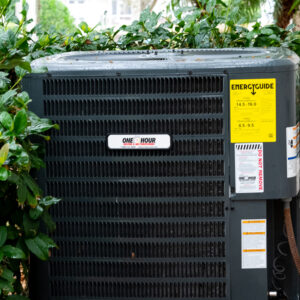Are Capacitors Most Likely to Fail on an AC Unit?
You hear the hum of your air conditioner… and then silence. The house starts to warm up, and before long, you’re sweating and wondering what just happened. This story plays out a lot during hot months, and at One Hour Magic, we’re no strangers to last-minute AC calls. The most common reason? A failed capacitor.
Let’s walk through what capacitors do, why they fails so often, and how to spot the signs before you’re left without cool air.
The Workhorse Behind the Scenes: The Capacitor
If your air conditioner were a car, the capacitor would be the battery that helps it start. It stores energy and delivers a burst of power to get the compressor and fan motors running. Without it, your unit can’t fire up or stay running smoothly.
There are two main types of capacitors in most systems:
- Start capacitors — give the system the jolt to kick on
- Run capacitors — help keep the compressor and fans going during operation
These little cylinders might not look impressive, but they do a big job and wear out faster than almost any other part of the system.
Why Do Capacitors Fail So Often?
Capacitors get pushed hard. Every time your unit starts, they’re working. They sit in hot environments, take on power surges, and age like everything else.
Here’s what takes them out:
- Heat – High temperatures shorten their life
- Power surges – Lightning and electrical spikes can fry them
- Time – Most only last 5–10 years before they give out
- Improper sizing or cheap parts – Bad matches or low-quality replacements burn out fast
We’ve pulled out plenty that looked like they were ready to pop. Some even bulge at the top or leak fluid. Once that happens, the AC is out of commission.
How to Know a Capacitor Has Failed
Sometimes, your system gives you hints. Other times, it just stops dead in its tracks.
Here’s what to watch for:
- AC turns on but doesn’t cool
- System hums or clicks but doesn’t start
- Fan outside doesn’t spin
- Breaker keeps tripping
- Warm air blowing instead of cool
- You smell something burnt near the unit
If any of these show up, your capacitor could be to blame. Don’t ignore it—running your system with a bad one can damage the compressor, which is a much pricier repair.
When to Call for Professional Help
This isn’t a part you want to mess with unless you really know what you’re doing. Capacitors can hold a charge even when the power’s off—and yes, they can shock you.
Call us at One Hour Magic if:
- Your AC unit isn’t turning on or seems stuck
- You hear humming or clicking noises
- You’re not getting any cool air
- Your system starts and stops frequently
- You’ve had capacitor problems before and want it checked
We can test it with the right tools, replace it safely, and check for any other hidden issues before they turn into major problems.
Our Process: Quick and Safe Repairs
Here’s what we do once we arrive:
1. Inspect the Unit
We open up the panel, check the capacitor visually, and look for signs of swelling, burns, or leaks.
2. Test with a Multimeter
We check the capacitance to see if it’s still holding the right charge. If it reads low or zero, it’s done.
3. Replace the Part
We swap it with the correct size and rating. There are no off-brand, poorly matched substitutes.
4. Test the System
We fire the unit back up and check the fan, compressor, and thermostat control to make sure everything’s working as it should.
5. Clean Up and Confirm
We clean the area, close everything up, and talk you through what we did and what to expect next.
FAQs
Can I replace the capacitor myself?
Technically, yes. But it’s risky. One wrong move and you could get shocked—or damage the system. We recommend leaving it to us.
How long does it take to replace?
Usually under an hour. It’s one of the fastest AC fixes we do.
How much does it cost?
Compared to other AC parts, capacitors are affordable. The real value is catching the issue before it damages something else.
Will replacing a capacitor make my system run better?
If the system was struggling to start or cycle properly, yes. It can help with performance and extend the life of your compressor.
How can I avoid future failure?
Regular maintenance. We check capacitors during tune-ups and can catch weak ones before they quit.
Don’t Wait for a Full Breakdown
A failed capacitor isn’t the end of the world—but it can feel like it on a 95-degree day. At One Hour Magic, we keep these parts stocked in every truck and fix most capacitor issues on the spot.
If your AC isn’t acting right, give us a call. We’ll take care of it quickly, safely, and with zero guesswork. Your comfort matters—and so does your time. Let’s get your system running right again before you have to pull out the box fans.
